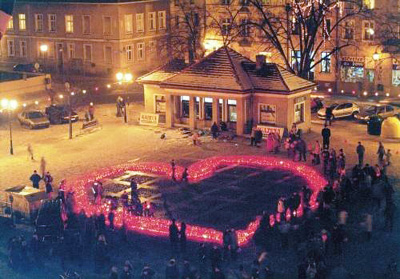Judging from the media and advertising you’d almost believe that Walentynki (St. Valentine’s Day) is a long-standing Polish tradition. It is not. When I was a high school student in the ancient days of… oh well, let’s say, the late 80s (yes, I know, I am dating myself here) nobody ever heard about Święto Zakochanych (Lovers’ Celebration, or Celebration of Those in Love). And those foreign imports that did hear about it, didn’t celebrate it.
Valentine’s Day reached Poland sometime in the 90s and looks like it’s here to stay.
Though I’m reading that there is some backlash in Poland against Walentynki, it seems that the younger generation embraced the holiday whole-heartedly. For a few weeks my friends (granted, all are women) were busy discussing about what to get their boyfriends or husbands for Święto Zakochanych. For those with foreign boyfriends or husbands, especially those from Anglo-Saxon countries, the celebration is almost obligatory.
So let’s learn some obligatory phrases:
- Kocham cię. – I love you.
- Lubię cię. – I like you.
- Nie mogę bez ciebie żyć. – I can’t live without you.
You can add “bardzo” to the beginning of the first two sentences and get “I love/like you very much.” When doing that, you also have to remember to move the pronoun “cię” BEFORE the verb – the sentence sounds better that way.
- miłość (noun, fem., pl. miłości) – love
- przyjaźń (noun, fem., pl. przyjaźnie) – friendship
- dziewczyna (noun, fem., pl. dziewczyny) – technically, it means “a girl,” but used in a romantic context – girlfriend.
- chłopak (noun, masc., pl. chłopaki) – technically, it means “a boy,” but used in a romantic context – boyfriend.
- mąż (noun, masc., pl. mężowie) – husband
- żona (noun, fem., pl. żony) – wife

Big lantern heart created in Chełmno.
photo: wikipedia





